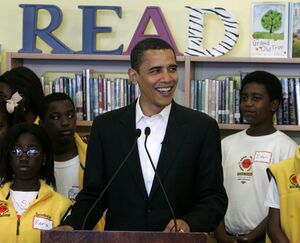UnNews:Obama unveils education reform plans
| A newsstand that's brimming with issues | ✪ | UnNews | ✪ | Tuesday, March 3, 2026, 05:47:59 (UTC) |
| Obama unveils education reform plans | 
|
21 March 2009
Washington, DC

"It's time we stop asking ourselves 'is our children learning', and start asking ourselves, uh, are we providing all of our children with opportunities, with the best education, founded in science and math, and also history, culture, civics, art, so that our smartest children once again can once again compete on the world stage against the smartest children from China, from Japan, from Germany and Sweden, and all around the world. Uh, there was a time when the United States was de facto world leader in innovation and progress, but in order to maintain this position, and I know what we are capable of, we need to start by educating our children," President Obama spoke yesterday at a press conference announcing his proposed new education reform policy[1]. Earlier, copies of the policy were distributed to members of Congress, who will meet to debate and revise it before voting on it and returning it to the president for final approval.
The proposed legislation differs from its predecessor, The No Child Left Behind Act of 2001, in many ways. Under the old law, for a school to get federal funding, every student had to pass a rudimentary test of knowlege [sic]. Under the proposed new law, only a single student from each grade and school would be required to pass the assessment, for which the bar will be set much higher. While the administration officially refers to the plan as The Elementary and Secondary Education Reform Bill of 2009, opponents have begun to refer to it as The Save Only The Kids You Can Reasonably Expect To Save And Leave The Rest Behind Act, a name they hope brings to mind negative comparisons to the old law. Administration officials have not refuted the accuracy of the nickname.
When questioned, most congressmen admitted the proposed legislation was still sitting unread on their desks, as it is, as congresswoman Sue Wilkins Myrick (R - North Carolina) put it, "hefty, not Friday afternoon reading material[2]. I'll get to it on Monday." Because of the large scope and partisan nature of the bill, it will likely undergo several rewrites and take weeks to get through Congress, which breaks for two weeks of vacation in April. White House press secretary Robert Gibbs says this was accounted for. "The school year doesn't start until September. Ideally, school administrators and teachers should have the summer to prepare their curricula, but we understand there is a process."
The You Can Lead a Child to Education but You Can't Make Him Learn Act

The proposal centers around the idea that a good education is a right of American citizens, and that all children in the American public school system should be guaranteed access to a high quality education. Once this access is guaranteed, it is up to the student (with the encouragement of his parents) to choose to take advantage of the education offered to him. The thinking goes that not every child is willing (or capable, but especially willing) to learn everything that should be taught in an elementary and secondary school education, and that the solution to this problem is not to continue to lower standards until the curriculum is so prosaic that everyone is equally interested.
The bill provides several avenues for schools to increase their allotment of federal funding. These include
- student standardized assessment performance
- a teacher salary allowance, which increases with number of teachers employed, and with teacher performance
- an "Interference Submission Deduction Waiver", which allows poorly performing schools to receive federal funding if they submit to federal interference.
The bill also sets a minimum funding level, and if federal funding does not reach this level, local and state funding must make up the difference. This measure was designed to increase parental and community investment in the children, as better performing schools require less local funding, driving down property taxes.
The bill describes a set of standard assessment tests for each grade level. These tests are nationally standardized rather than state specific, in order to prevent the phenomenon known as "Florida Drift"[3] observed under NCLB. These tests are completely optional for the students, but the bill indicates schools incentivizing students and suggests rewarding test-takers with ice cream. It is left to the school districts to decide between a flat or a performance based ice cream allotment. For elementary school (grades 1-5), the tests are straight-forward multiple choice covering reasoning (logic, math, reading comprehension) and subject knowledge (science, literature, civics, history). For middle school (grades 6-8), the tests are divided into five subject areas, from which students may pick and choose and must pass two in order to pass the overall exam. These subject tests are further subdivided into a multiple choice section and a freeform essay on whatever topic relevant to the subject students wish.
For a school to receive funding, at least one student from each grade level must pass the exam, showing that the education provided at the school is good enough that at least one student was able to excel. At an average school, this is one out of every 63.3 students. ("Special" schools do not need to meet this requirement as long as they attach themselves to a regular school and allow (in theory) a free transfer of students between the schools.) The policy suggests that schools be stratified into roughly three classes based on current child achievement levels, but requires that schools make it possible for any students to take the "smart kid class" if they desire, including providing tutoring for students who wish to catch up and transfer. Some administrators from small schools have complained that it is inherently unfair that they, by design, would need to achieve higher pass rates, but smaller class sizes in general lead to better performance, and most experts believe that this will even out just fine.
On the subject of teachers, the bill proposes an increase of minimum starting salaries from $11,000 a year to $35,000 a year (on par with garbage collectors), and encourages raises based on performance and not seniority. It also provides for increased funding with more new hires, and points out "IF YOU HIRE MORE TEACHERS, YOUR CLASS SIZES GO DOWN, YOUR STUDENTS PERFORM BETTER, AND YOU GET MORE ASSESSMENT-BASED FUNDING" [emphasis theirs]. The administration hopes this will create new jobs.
In the event a school district needs more federal funding but is unable to fulfill the other requirements, the school may request an "Interference Submission Deduction Waiver". Under the ISDW, the district is temporarily taken over by a federal agent who will restructure everything from administration and payroll to curriculum and schedules to classroom seating arrangements and student lunches. The administration argues that this is not a "states' rights" issue, as the state has the right to not accept the help and continue sucking.
The Finally, Some Sense in Elementary and Secondary Education Act
Proponents of the bill believe that it is the first step to restoring education and intellectualism to its proper status in US culture, in turn restoring the US to its position as a world leader in science, technology, and culture. "If you look around America today, there seems to be this rash, and a 'rash' really is the best word to use here, of people who really celebrate their own ignorance. These are people who take pride in having never read a book or a newspaper or a magazine or a subtitle in their lives. These are people who have homemade 'PALIN 2010' signs on their lawns. These are people who like football a lot but still don't put in any effort to understand the strategy. This isn't populism. Andrew Jackson was a populist. These people don't know or care who Andrew Jackson was," observed Secretary of Education Arne Duncan. "I don't know when this happened. When I was growing up, the smart kids were the ones all the other kids wanted to be like."
While others have clearer, more realistic memories of their own childhood, many echo the idea that the current American Public School System, and indeed all of American culture, promotes submediocrity and general idiocy. As one administration official put it, "It's like in Harrison Bergeron, you know, when in order to make all the smart people as stupid as the stupid people, they make them listen to annoying high-pitched noises to break their concentration. That's what it was like trying to learn under No Child Left Behind. The teachers had to keep teaching to the test and repeating things for the stupid kids. It was annoying and we couldn't learn anything." Another administration official quickly added "Malia is a fifth-grader, not an administration official. The administration is not implying in any way that any American children are less equal or less deserving than others simply because they are not fast learners. This new law is a change in policy, not an attack on children. Speaking of children, your questions would best be answered at an official press conference, by administration officials." A third administration official added "It's like the pirate code! Any pirate who falls behind is left behind!"
Better for the smart kids

Few people have argued that this bill is bad for smart kids, with the notable exception of Michael Roorback, a Connecticut 6th grader who blogged his belief that if this act passes, it would increase competition for merit-based scholarships and even acceptance at the best colleges, which would result in a requisite increase in scholastic effort and corresponding decrease in video game playing time for him for the next five years. The post led to a "No Call of Duty for History Books" warcry among smart kids who believed that an increase in the quality of standard education would weaken their bargaining position with their parents over the educational benefits of their hobbies. An anonymous comment on the blog purported to come from someone in the administration acknowledged the validity of the position and provided the kids with an outline of the arguments the poster had used in the sixties to convince his grandparents that reading Spiderman would make him a better person[4], which he suggested they adapt for their own purposes.
Better for the dumb kids
One of the loudest arguments for the NCLB act over the past eight years has been its ostensible benefits for really stupid kids. Even the name suggests that the act is in the best interest of the dumtards who would otherwise be "left behind" by education, instead bringing them up to the level of their peers. As it turned out, however, it wasn't possible to bring every student up to the baseline level[5]. In these cases, many students were actually encouraged by teachers and school administrators to drop out of school. There was also a sharp increase in the number of "unfortunate field-trip accidents" over the past four years, many targeting students who under-performed on achievement tests. Both sides have turned a blind eye to these incidents, as pro-NCLB-ers didn't want to shine a negative light on the act, and anti-NCLB-ers are mostly Darwinists.
Under the new policy, unintelligent kids won't even have to come to school on test day, much less do well, which bill supporters believe will reduce both dropout and mortality rates.
Better for the average kids, even
Decades of studies in childhood education show time and again that children learn best in an environment where they are being challenged, but not too much. Noted child psychologist David Elkind estimates that the standards set by the bill are only truly achievable by 8% of students, but will only go completely over the heads of 15% of the student population. He claims the remaining 77%, given the right incentives, would not only be able to follow what is being taught but also remember some of it afterward and even find some of it interesting. "I call this the 'French Whores' phenomenon. Little boys will sit in history class learning about Benjamin Franklin. They may forget that the man was the ambassador to France from '76 to '85, or that he was the president of Pennsylvania, but they always go running home 'Daddy, daddy, did you know Benjamin Franklin used to electrify chickens for fun and have sex with French whores?' and the next thing you know, the kid and his dad are watching the History Channel[6]. Good teachers will try to find interesting things to entice their students to pay attention and to learn."
By removing incentives to "teach to the test", or rather by designing the test to encourage the fostering independent thought, the bill encourages teachers to tailor lessons to his or her students' interests and level. Dividing out the students by aptitude only increases this effect, as some students find French whores funnier than others and the curriculum can be adjusted to reflect that.
Many people applaud the bill for its promotion of a return to intellectualism, but some believe it doesn't go far enough. Keith Olbermann said on Friday night's Countdown with Keith Olbermann's popular Still Bushed! segment, "This is great. We should be encouraging smart kids to use their intelligence. But what this bill doesn't do is it doesn't do anything to create more smart kids. Now, eugenics is wrong, you won't hear me promoting eugenics, but we should be encouraging smart people to breed more. It's always stupid people. Religious nuts, psycho celebrity stalkers, children of crackheads and moose-eat--" before the producers cut to commercial.
The Why Do You Hate American Children Act
Opponents of the bill say it is harmful to children. It is also bad for the economy, promotes terrorism, and erodes gun rights.
Increased accountability
Under NCLB, the only measure of a child's success was a standardized test pre-curved for a 95%+ pass rate. If a student passed, it was assumed he was doing well. Parents, teachers, and the school were satisfied.
Under the new act, the message for many parents will go from "your child is learning as well as all his other classmates" to "your child is not learning as well as some of his classmates." Most parents won't care, but others will demand to know why their precious snowflakes aren't receiving the necessary attention. Teachers will argue that parents need to take an active role in their childrens' lives, that schools need to provide them with more resources, and that the district is underfunding the school. School administrators will argue that the quality of teacher applicants are low because the district won't increase salaries. Districts will blame schools for not doing more to involve parents. The schools, districts, and states will blame the federal government for taking away their right to delude parents about the quality of their schools.
Moreover, all of these people and institutions will be accountable to the student.
Hinders future military recruitment
Some of the loudest objections to the bill have come from the US military, which largely supported NCLB[7]. The new law, they argue, will lower the performance and motivation of the students at or below the 15th percentile of intelligence, from where the military traditionally recruits most of its enlisted men, and will raise the aspirations of students around the 85th percentile, from where the army recruits most of its commissioned officers, making them more likely to choose a civilian or academic career over a military one.
Also, bitter retired Lt. General Ricardo Sanchez pointed out that the new law would do little to break students' spirits and prepare them for a career of blindly following orders.
But, but, but STATES' RIGHTS!
But, but, but states' rights!
Why do you hate American children?
The Blue Penis Act
On the Friday night episode of The Rachel Maddow Show, Rachel Maddow quipped "You know, it's been less than a day since the bill was presented, and its naysayers are already coming up with all sorts of ridiculous names for it, like The Save Only The Kids You Can Reasonably Expect To Save And Leave The Rest Behind Act and The Why Do You Hate American Children Act. I like this bill. I think it'll be good for the future. I'm going to start calling it The I Imagine an America where Adults Watch, or, you know, Read The Watchmen and then Discuss Moral Absolutism vs. Moral Relativism or Something Like That instead of the Blue Penis Act[8]. Somewhere in England right now, Alan Moore is crying, and not just because of all the money he's passed up[9]. You know I love you, Alan."
In a show of amazing turn-around speed, that night's Hannity featured a looped clip of Maddow saying "the Blue Penis Act" over and over for three minutes. Guest commentator Elizabeth Hasselbeck[10] followed up with "You know, I hate to be crass, but I think she just needs to get laid." Host Sean Hannity responded "You know she's gay, right?" to which Hasselbeck then said "Really? Well then I don't get the whole penis thing."
Sources
- ↑ Maureen Downey "ISSUE IN-DEPTH: OBAMA’S EDUCATION PLAN: Improvement requires will to make changes". The Atlanta Journal-Constitution, March 22, 2009
- ↑ "Sue Wilkins Myrick never went to college, and look at her now, she's a congresswoman and a leader in education.". National Council on Bible Curriculum in Public Schools,
- ↑ Marcia Ford Seiler et. al. "You think I'm joking!?". A Compendium of State Education Rankings, June 18, 2007
- ↑ Matt Brady "5 Lessons We Hope Obama Learned from Spider-Man". Newsarama, November 13, 2008
- ↑ Sandra Nichols "However, merely raising the doorstep does not make people watch their step". Pajaro Valley Unified School District Governing Board, April 26, 2003
- ↑ Some Ben Franklin expert "Drunk History vol. 2". Drunk History, February 3, 2008
- ↑ The Military "The Military Loves NCLB". The Military, 2001
- ↑ "Rachel Maddow would go straight for Alan Moore". The Rachel Maddow Show, March 21, 2009
- ↑ Stewart Lee "Stewart Lee talks to Alan Moore". Chain Reaction (radio), January 27, 2005
- ↑ "Elizabeth Hasselbeck praises stupidity on Hannity. "She is the sole white conservative on The View."". Hannity, March 21, 2009
| Poo Lit Surprise-Winning Article | |
This article was chosen as the 1st Place in Alternate Space Category in the 7th Poo Lit Surprise writing competition.
| |
| Featured version: 24 April 2009 | |
| This article has been featured on the main page. — You can vote for or nominate your favourite articles at Uncyclopedia:VFH. | |


